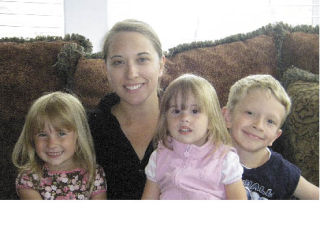“When your abilities do not define you, what truly matters will begin to shine. That is the rise of the sun.”
The line, taken from Buckley resident Amanda Ostheller’s self-published novel “Rise of the Sun,” exemplifies her feelings about Tourette Syndrome.
“It’s about a guy who has special abilities and learning that what he does, doesn’t define who he is,” she said. “Which is the same as Tourette’s.”
Ostheller is donating 100 percent of the profits from her book sales to the National Tourette Syndrome Association, the only nonprofit, voluntary-membership organization in the United States researching Tourette Syndrome.
She recently returned from a book signing at the Petersburg Public Library in Alaska where she helped raise awareness and answered questions about the disorder.
“Rise of the Sun” is the result of one of Ostheller’s small writing pieces she scribbled while at home with her son Trevin, 7, and daughters Kadie, 4, and Briana, 2. Her short story quickly became an expansive novel hundreds of pages long.
She said she did not initially plan to transform her work into a complete book. At the time, she was raising money for TSA and the idea of selling books became the perfect way to help fund research for the disorder inflicting her son.
Trevin was diagnosed with Tourette Syndrome two years ago. He began blinking and twitching, a condition Ostheller associated with allergies, figuring it would stop. His condition remained as he approached age 6.
She took Trevin to her doctor and was forwarded to a Tourette specialist, where it was confirmed her son has Tourette Syndrome.
Initially, Trevin’s condition wasn’t severe enough to hinder his abilities and did not require medication. But his physical and verbal ticks grew worse over time.
“All the sudden he stopped sleeping because the Tourette’s would keep him up at night,” Ostheller said. “He would be up until 1 o’clock in the morning, tired as can be, but he couldn’t go to sleep.”
At that point, Ostheller began giving Trevin medication to help him rest during the night. She said each child reacts differently to the prescribed medication and it often loses its effect over time.
“It’s a hit or miss game,” she said.
Ostheller believes that the biggest misconception surrounding Tourette’s is that the disorder involves random cursing.
“A very small percentage of kids that have Tourette’s actually do that,” she said. “For at least half of them, it’s completely gone by the age of 12. It’s not even that big of a percentage that goes on into adulthood.”
Adding another complication is the negative reaction some have toward those with the disorder. Ostheller has noticed Trevin is sometimes looked at differently because of the ticks and noises associated with his illness. She said it perpetuates the idea of Tourette’s being a socially unacceptable disease.
In their continuing battle against Tourette’s, Ostheller and her husband Joel are planning to run in the Disney World Marathon Jan. 9 in Orlando, Fla., Trevin’s birthday. Ostheller will run the half-marathon while Joel runs the full distance. Trevin will compete in the Family Fun Run 5K.
“Our goal is to raise $500 for each of us,” she said.
“It’s a good cause and (Tourette’s) often goes undiagnosed,” Joel Ostheller said. “It makes things a lot easier when you have knowledge of Tourette’s.”
He explained that many parents don’t know enough about the disorder to properly treat their children and pass the condition off as a behavioral problem.
Ostheller is continuing to work on the next two installments to the “Sun” trilogy and hopes to have the second book, “The Sun Will Fall,” finished by October.
That is, if her children don’t offer too much of a distraction.
“Rise of the Sun” was published in March and has grossed more than $300 for Tourette’s research. Ostheller said she wants to raise more than $1,500 before her family travels to Florida.
Tourette Syndrome is defined as neurological disorder involving verbal and motor ticks, random noises and grunts combined with sudden, involuntary movements. It is diagnosed between the ages of 5 and 7 and there currently is no cure.
Further information on Tourette Syndrome can be found on the TSA Web site at www.tsa-usa.org.
Related:
- Watch a YouTube video dedicated to Trevin.


